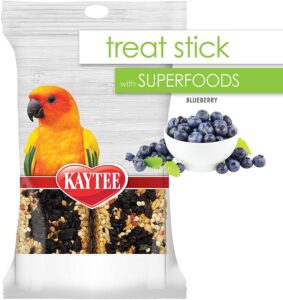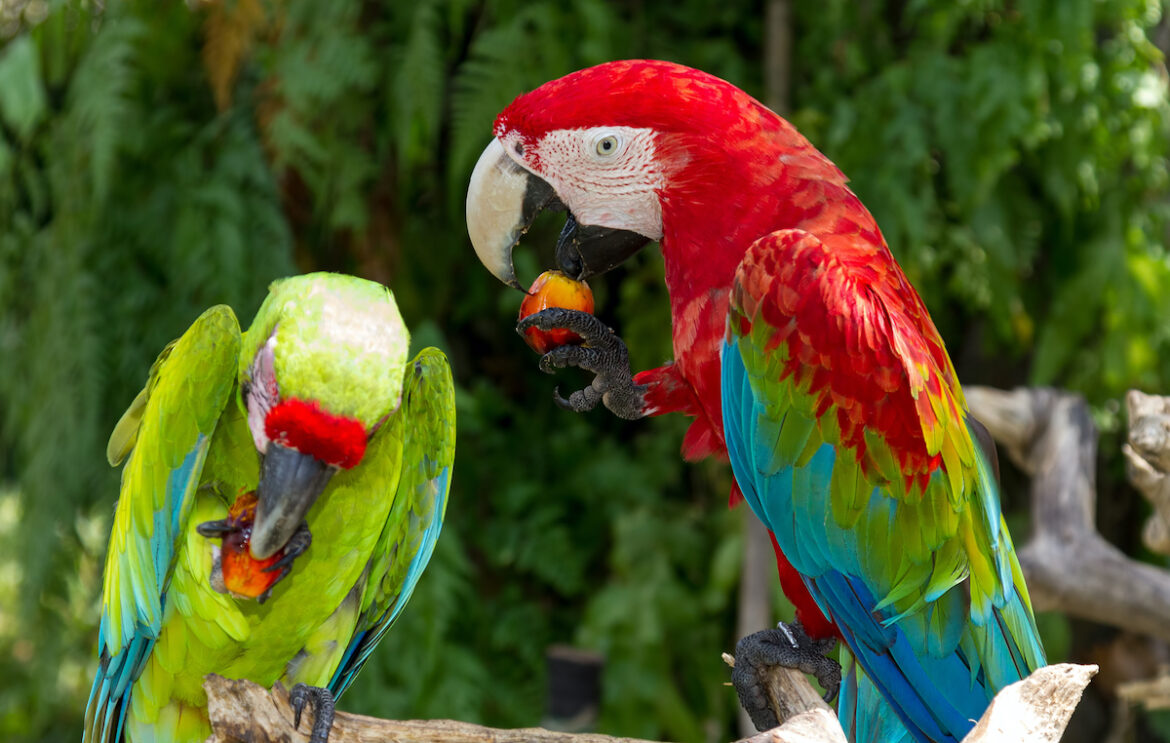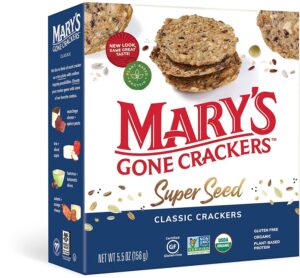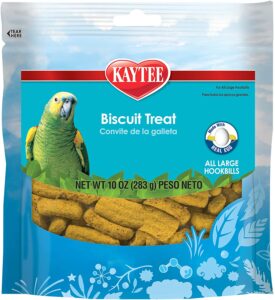When you take a look at pets from around the world, the one bird that seems to be a general favorite is the parrot. These beautiful creatures are tons of fun with their constant chatter and adorable antics. Yet, pet parents worry aimlessly about the kind of diet that their pets should stick to in order to live a long, healthy, and happy life.
So, if you’re wondering whether Polly really does want a cracker, wonder no more.
Can parrots eat crackers? Technically, parrots can eat crackers with a low salt and sugar content. Most plain crackers do not pose any immediate threat to your bird, however, they don’t provide any nutritional value for birds and should only serve as an occasional treat for your parrot.
You can read on more to find out why crackers are not wholesome treats for your parrots. And, if your parrots love to munch on crackers, then you will also need to find out how often your winged friend can eat crackers.
Should Parrots Eat Crackers?
Before you can look into the the matter of how much or what kind of crackers your parrots can eat, let’s look into the subject of crackers and their ingredients.
Crackers are made of a few basic ingredients – wheat flour, yeast or chemical leaveners, water, sugar, salt, and other enriching ingredients. These contents make up a baked good with a hard bite, low moisture, and long shelf-life. You can get many different types of crackers, but we’ll be looking at Saltines (soda crackers) and snack crackers (enzyme/chemical crackers).
There aren’t many health benefits associated with the consumption of crackers. Crackers fall into ‘filler’ food. But, if there’s anyone out there telling you that crackers are wholesome, they couldn’t be more wrong. In short, crackers aren’t healthy for your pet bird.
Cracker Ingredients To Look Out For
Looking at the individual elements of a cracker will give you a pretty good idea of why crackers aren’t something that should be used as a common treat for your parrot.
1. Salt
Salt is a condiment that humans love to add to almost every meal. But, excessive salt consumption means that your parrot will retain water in its system; there is a high probability of dehydration, excessive thirst, and kidney failure if they consume too much. High quantities of salt are potentially toxic for most pets, and it is an ingredient that most pet parents choose to avoid.
2. Sugar
Another ingredient that most pets do not do well with is sugar. It isn’t as if your parrot will die instantly with the consumption of sugar, but the more sugar your pet has, the more it will be prone to obesity, blood sugar problems, and heart conditions. And, sugar seems to be highly addictive with parrots because they are fruit eaters and love sweet treats.
3. Yeast
Yeast or chemical leaveners are added to the mix of crackers to raise the dough. Now, it is an ingredient that is commonly found in most baked goods. But, it shouldn’t be a part of your parrot’s diet. Yeast can clog in the digestive system of your bird and cause several problems like irregular bowel movements, constipation, and stomach upsets.
Flavoring And Additives
Crackers are human food, and you wouldn’t tag crackers as a wholesome snack even for humans. But, when it comes to birds, you have to realize that these creatures have delicate constitutions, and even a tiny toxic component can do much damage to their minute bodies.
Flavoring and additives are nothing more than chemicals that are used to give food a longer shelf life and different flavors. Adding chemicals for different flavors only inserts a harmful factor into the food.
Types Of Crackers
Let’s take a look at a few of the most popular crackers out there to understand which ones are okay as occasional treats and which ones should be left out of your parrot’s diet entirely.
1. Saltine Crackers
Saltine crackers are crackers with the added element of salt. Now, you already know that excessive salt isn’t suitable for parrots. Too much salt can cause irreversible damage to the kidneys and even result in death.
Saltine crackers are the saltiest option in the market. So, if you do want to offer your parrot some crackers, perhaps it would be a smart move to go for another cracker variety.
2. Graham Crackers
Graham crackers are pretty popular for their delicious taste and crunchiness. Yet, when you take a closer look at graham crackers, you’ll see that they are laden with sugar. As you already know, extra sugar for parrots can mean a whole array of health issues.
Refined sugar in the food of a parrot can lead to subclinical deficiencies. Technically, refined sugar weakens the immune, nervous, endocrine, and digestive systems. As such, your parrot will not only become more prone to infection but suffer from behavioral problems such as hyperactivity, feather-picking, anxiety, and depression.
3. Ritz Crackers
Another choice available in crackers is Ritz crackers, which are not as salty as the saltine variety but are still fairly salty. And, as you know by now, excess salt in a parrot’s system can generate a whole host of health issues over time.
If your parrot happens to munch on a Ritz cracker, then you need not worry that your feathered friend will kick the bucket any time soon. But, when it comes to giving treats and snacks, you ought to go for nutritional choices, and a Ritz cracker just isn’t one.
4. Toasted Crackers
Toasted crackers are the only variety of crackers that aren’t full of salt or sugar. And, they are preferred by many parrots due to their unbeatable crunch.
However, much like all the other cracker types discussed previously, it’s best to skip toasted crackers too, when it comes to your parrot. Remember, salt is just one worrying ingredient in crackers; there’s also accounting for the yeast and sugar factor.
Parrot-Friendly Crackers
If there’s a cracker brand out there with whole wheat, that’s also low on sugar and salt and is overall healthier than the mainstream options, you can feed it to your bird occasionally.
In fact, just to show you we’re absolutely committed to your parrot’s well-being, we’ve done the heavy-lifting and come up with several cracker options you can feed your pet safely.
1. Mary’s Gone Crackers Super Seed Crackers
Mary’s Gone Crackers are picking up a lot of popularity, and it’s easy to see why. To begin with, these crackers are gluten-free and organic. Then there’s the fact that the recipe doesn’t include any added oils, fat, or sugar.
Additionally, the ingredients don’t list yeast, and the sodium content is much lower than other cracker brands.
Finally, the crackers are extra crunchy thanks to the inclusion of pumpkin, sunflower, flax, and sesame seeds. In other words, these crackers might as well have been custom-built for parrots.
However, remember that even though there are a lot of positives about this product, they should only be used as an occasional treat – to be on the safe side.
2. Kaytee Biscuit Treat For Parrots
Why settle for crackers for humans when you can feed your pet specially-formulated biscuit treats?
The Kaytee Biscuit Treat is ideal for macaws, parrots, and cockatoos. It includes numerous nutrients and vitamins, such as DHA, Vitamin E supplements, and Vitamin B12, to ensure your pet’s dietary needs aren’t overlooked.
The product appears to be highly popular with bird owners and has countless rave reviews on major online retail sites.
3. Kaytee Avian Superfood Treat Stick

Kaytee seems to have their avian-treat game down because clocking in at number three on our list is the brand’s Superfood Treat Stick.
Formulated for medium breeds, this treat features everyone’s favorite, blueberries, and is likely to be a big hit with your pet parrot.
The first five ingredients of the treat include millet, canary grass seed, dried blueberries, red millet, and oat groats.
The Kaytee Avian Superfood Treat Stick ticks all the right boxes and will undoubtedly become your pet’s favorite snack in no time.
Aside from that, the recipe also features supplements like Vitamin A, E, B12, and riboflavin. The treat sticks come equipped with a hanger that allows you to suspend the treat in your pet’s cage.
Note, however, that the instructions state that one stick per week is more than enough for your pet.
Up Next: Can Parrots Eat Cucumbers?


